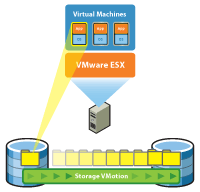VMware vSphere 7 Deprecated Features, Plugins and Add-ons – Changes revealed
VMware has announced that VMware vSphere 7 will no longer support several VMware features, add-ons, and plugins. The deprecation of these features may come as a disappointment to some users; however, it is important to remember that VMware is constantly innovating and introducing new features to its product line. As such, the decision to deprecated certain features is likely based on VMware’s belief that the newer features are better suited to meet the needs of its customers.
VMware vSphere Clients
In vSphere 7.0, you can take advantage of the vSphere Client’s capabilities (HTML5). No longer accessible, the Flash-based vSphere Web Client has been deprecated.
Individual ESXi hosts that are not linked to a vCenter Server system can be managed using the VMware Host Client, a web-based tool.
TLS Protocol and VMware vSphere 7.0
By default, TLS 1.2 is enabled in vSphere 7.0. TLS 1.0 and TLS 1.1 are by default deactivated. If you upgrade vCenter Server to version 7.0 and that vCenter Server instance connects to ESXi hosts, other vCenter Server instances, or other services, communication issues may arise.
To fix this issue, you can temporarily activate previous versions of the protocol on 7.0 computers using the TLS Configurator software. After every connection uses TLS 1.2, you can disable the previous, less secure versions. See Managing TLS Protocol Configuration with the TLS Configurator Utility for further details.
Deprecation of External Platform Services Controller
Deploying or upgrading vCenter Server in vSphere 7.0 involves the usage of the vCenter Server appliance, which is a preconfigured Linux virtual machine designed for running vCenter Server. The new vCenter Server includes all Platform Services Controller (PSC) services, keeping functionality and workflows such as authentication, certificate management, and licencing. No longer is the deployment and use of an external Platform Services Controller required or possible. All PSC services have been integrated into vCenter Server, and deployment and management have been streamlined.
Removal of Windows Support for vCenter Server
vCenter Server for Windows has been withdrawn from vSphere 7.0, and support is no longer available. This means you will have to go for VMware vCenter in appliance OVF format only. I guess it does mean saving money on Windows licensing for vCenter VM.
VNC Server removal from ESXi
The ESXi built-in VNC server has been deleted in vSphere 7.0. By setting the RemoteDisplay, users will no longer be able to connect to a virtual machine using a VNC client. vnc.enable configure to be true. To connect virtual machines, users should instead utilise the VM Console via the vSphere Client, the ESXi Host Client, or the VMware Remote Console. Customers wishing VNC access to a virtual machine (VM) should utilise the VirtualMachine.AcquireTicket(“webmks”) API, which provides a VNC-over-websocket connection. The webmks ticket provides access to the virtual machine console after authentication. Please refer to the VMware HTML Console SDK Documentation for additional details.
Discontinuation of VMKLinux
VMKLinux driver compatibility has been deprecated and removed in vSphere 7.0. vSphere 7.0 will not include support for VMKLinux APIs and their accompanying drivers. Custom ISO cannot contain VMKLinux asynchronous drivers. Every driver included in an ISO must be a native driver. During installation or upgrading, any currently supported devices that are not supported by native drivers will not function and will not be recognised. VCG will not display devices that are not supported by a native driver in vSphere 7.0.
Obsolescence of 32-bit User Interface Support
32-bit userworld support has been deprecated in vSphere 7.0. Userworlds are the ESXi components that partners use to deliver drivers, plugins, and other system extensions (distributed as VIBs). Userworlds are not accessible to customers.
vSphere 7.0 supports 64-bit userworlds via partner devkits and will continue to support 32-bit userworlds through this major release. Support for 32-bit userworlds will be eliminated completely in the next major edition of ESXi. Before upgrading beyond vSphere 7.0, customers should confirm that any vendor-supplied VIBs in use have been upgraded to 64-bit to prevent feature loss.
Removal of the Update Manager Plugin
The Update Manager plugin that was used to administer vSphere Update Manager has been replaced with the Lifecycle Manager plugin in vSphere 7.0. In addition to additional capabilities for vSphere Lifecycle Manager, the Lifecycle Manager plugin continues to provide administrative activities for vSphere Update Manager.
Deprecation of Windows Integrated Authentication
vSphere 7.0 deprecates Integrated Windows Authentication (IWA), which will be removed in a future release. Refer to VMware Knowledge Base article 78506 for further details.
DCUI Smart Card Authentication Is Obsolete
In a future vSphere release, the DCUI will no longer support Smart Card Authentication. Users will be encouraged to do activities through vCenter, PowerCLI, API calls, or by signing in with a username and password instead of using Personal Identity Verification (PIV), Common Access Card (CAC), or SC650 smart card to access the DCUI.
Core Partition Profile deprecation in Host Profiles
Coredump Partition support in Host Profiles has been deprecated in vSphere 7.0. Users should convert from Coredump Partitions to Coredump Files.
Deprecation of Software FCoE Adapters
VMware deprecates the configuration of software FCoE adapters that use the native FCoE stack in ESXi beginning with vSphere 7.0 and intends to remove the feature in a future vSphere version.
MyVMware vendor add-ons compatible with vSphere Lifecycle Manager
In vSphere 7.0, vendor add-ons are accessible via vSphere Lifecycle Manager of vCenter Server if the vCenter Server instance is set to use a proxy or Update Manager Download Service. Navigate to the Custom ISOs and Add-ons tab on MyVMware to access add-ons. Under OEM Customized Installer CDs and Add-ons, you can locate the vendor-specific custom add-ons. Consult the Managing Host and Cluster Lifecycle documentation for further information on vSphere Lifecycle Manager and vendor add-ons.




